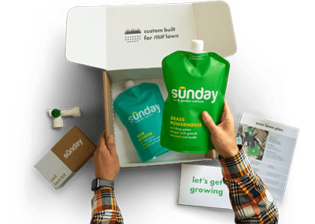Springtime in Massachusetts, when the air temperature warms and the landscape begins to transform from snow-covered wonder to luscious greenery, it’s the ideal time for homeowners to turn their attention to their lawns. But choosing the right grass seed can be as challenging as the state’s varying climate, with its hot summers and frigid temperatures in winter.
But worry not, the answer is closer than you think – Fine Fescue is an excellent choice. A popular choice among the cool-season grasses, it thrives in the state’s cooler temperatures and can withstand heavy foot traffic. It’s also drought resistant and keeps its dark green color, even in the face of Massachusetts’ often harsh conditions.
But there’s more to having a beautiful lawn than just picking a grass seed mixture. Read on as we delve into other grass seed options, and tackle the many factors that can influence your lawn’s health and appearance, from soil conditions to watering schedules. Let’s turn your lawn into the envy of the neighborhood!
Looking for the best grass seed for your region?
Our smart lawn plans are designed to work perfectly with your local soil and climate conditions, without any of the toxic stuff.
Use the code EHG20 for an instant $20 discount!
- Personalized lawn care: Custom lawn plans based on soil analysis, climate data, and your specific lawn needs.
- Convenience with a conscience: Products that are not only easy to use but also safe for you, your pets, and the planet.
- Science-backed formulas: Bio-based formulas contain effective, natural ingredients like seaweed, molasses, and iron.
- Expert support: Get one-on-one guidance from a real person and rest easy with Sunday's satisfaction guarantee.
Fine Fescue
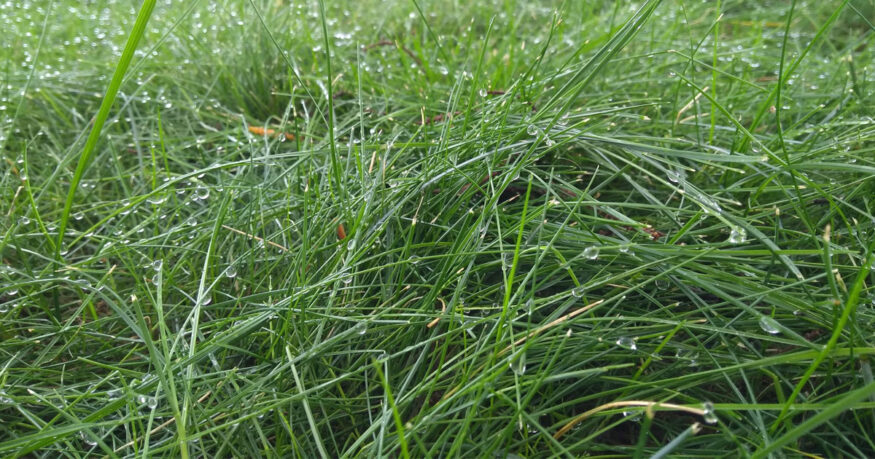
| Also Known As | Hard fescue, strong creeping red fescue, slender creeping red fescue, sheep fescue, chewings fescue; Festuca L. |
| Type of Grass | Cool season perennial |
| Optimal Zones | Northern zones |
| Root Structure | Medium |
| Winter Hardiness | Excellent |
| Shade Tolerance | Excellent |
| Water Requirements | Medium to High |
| Drought Tolerance | Excellent |
| Self Repair Capacity | Limited |
| Overall Maintenance Requirements | Low |
Why Fine fescue is The Most Popular Choice For Massachusetts
Choosing the right grass for your Massachusetts lawn can be an overwhelming task. Yet, the Fine Fescue stands out as an excellent choice, particularly for the eco-conscious homeowner. This cool-season grass is low-maintenance and resilient, making it perfect for those who wish for a lush, beautiful lawn without the need for constant upkeep.
The resilience of Fine Fescue truly shines in the face of Massachusetts’ hot, humid summers and its shaded, arid areas. Unlike other grass types that wilt in these conditions, Fine Fescue thrives, thanks to its unmatched drought and shade tolerance. If parts of your yard receive limited sunlight or if your region experiences a dry spell, this grass will retain its vibrant green color and soft texture.
Cold winters are par for the course in Massachusetts, making it crucial to choose a grass that can withstand freezing temperatures. Fine Fescue fits the bill as it’s a cool-season grass, meaning it can weather the region’s frigid winters. It ensures that your lawn stays healthy and vibrant throughout the year.
But remember, while Fine Fescue is notably drought-tolerant, it does require regular watering to prevent damage. Consistent irrigation is critical to maintaining its optimal condition. This means you need to ensure your lawn is adequately watered, particularly during hot weather and dry periods.
When it comes to maintenance, Fine Fescue demands less than other grass types. It grows quickly and has a soft texture. However, it doesn’t hold up well to heavy foot traffic. So, if you have children who use the lawn as a playground or pathways that see heavy use, consider alternate grass options for these areas.
Fine Fescue is a popular choice among Massachusetts homeowners. Its ability to thrive in challenging conditions, its low-maintenance requirements, and its appealing green color and texture make it a winner. By opting for Fine Fescue, you’ll have a lush, vibrant, and eco-friendly lawn that enhances your property’s curb appeal.
Learn More: Find out which grass type is right for your state with our comprehensive guides.
Kentucky Bluegrass
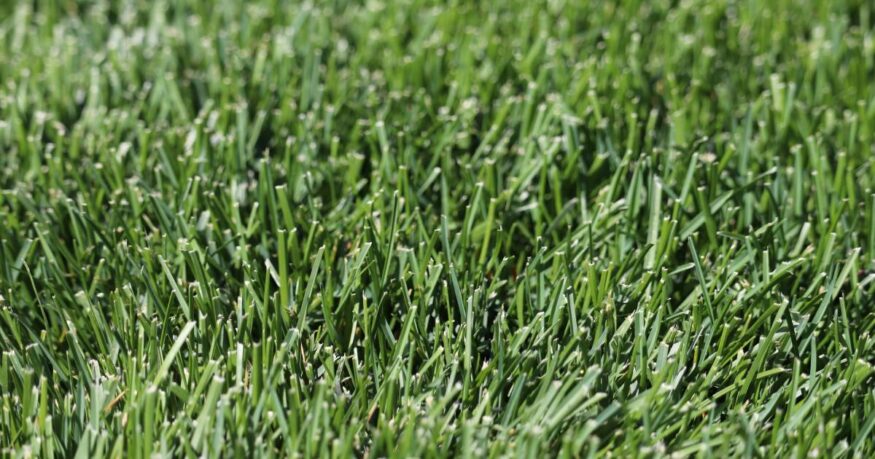
| Also Known As | Poa pratensis L. |
| Type of Grass | Cool season perennial |
| Optimal Zones | Northern cool season zone, transition zones |
| Root Structure | Shallow |
| Winter Hardiness | Excellent |
| Shade Tolerance | Poor to Good |
| Water Requirements | High |
| Drought Tolerance | Poor |
| Self Repair Capacity | Excellent |
| Overall Maintenance Requirements | High |
What Makes Kentucky Bluegrass A Great Grass For Massachusetts
Kentucky Bluegrass, a cool-season grass, should be high on your lists of grass types to consider. This grass variety is a favorite amongst homeowners in the northern part of the US, particularly because it thrives in a humid continental climate characterized by chilly winters and warm summers.
One of the primary reasons why Kentucky Bluegrass is such an ideal option for Massachusetts lawns is its appealing aesthetics. Its fine to medium leaf texture combined with its rich, dark green hue creates a visually stunning landscape. Furthermore, thanks to its sod-forming growth habit, this grass can spread via rhizomes, filling in any bare patches, and ensuring a uniformly green lawn all year round.
However, it’s not just about the looks. Kentucky Bluegrass has a notable ability to withstand chilly temperatures and frequent wear and tear, making it a robust choice for areas that see a lot of foot traffic. Interestingly, it can even recover from moderate drought stress by entering a semi-dormant state and resuming growth when conditions become favorable again. This resilience means you can enjoy a verdant lawn even during arid periods.
To ensure the longevity and color of your Kentucky Bluegrass lawn, proper care and maintenance are essential. This grass thrives in well-drained, fertile soil with a pH of 6 or above. Regular mowing to a height of 2 to 3 inches, depending on the season and your aesthetic preference, is also critical. Deep watering once or twice a week, based on rainfall and soil moisture levels, will keep your lawn green and healthy.
While Kentucky Bluegrass has numerous advantages, it’s important to also consider potential diseases. This grass variety can be susceptible to leaf spot, dollar spot, stripe smut, necrotic ring spot, and summer patch. To bolster the health and resilience of your lawn, incorporating a mix of different grasses and clovers can be beneficial.
Looking for the best grass seed for your region?
Our smart lawn plans are designed to work perfectly with your local soil and climate conditions, without any of the toxic stuff.
Use the code EHG20 for an instant $20 discount!
- Personalized lawn care: Custom lawn plans based on soil analysis, climate data, and your specific lawn needs.
- Convenience with a conscience: Products that are not only easy to use but also safe for you, your pets, and the planet.
- Science-backed formulas: Bio-based formulas contain effective, natural ingredients like seaweed, molasses, and iron.
- Expert support: Get one-on-one guidance from a real person and rest easy with Sunday's satisfaction guarantee.
Perennial Ryegrass
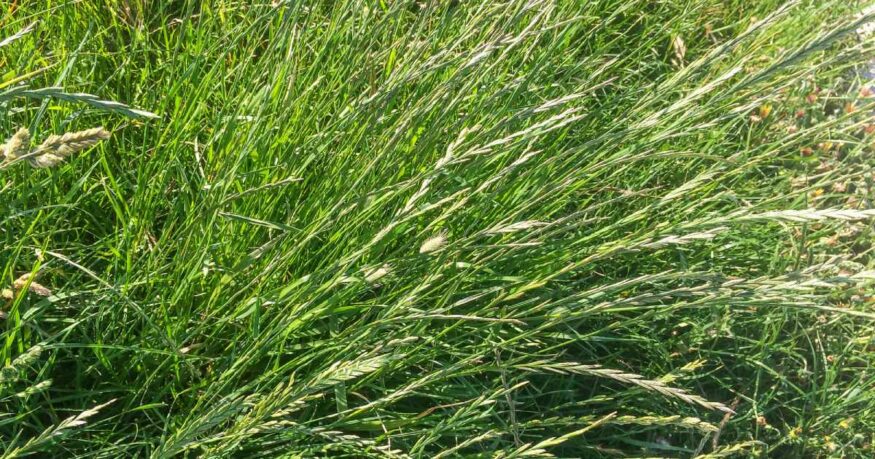
| Also Known As | Lolium perenne L. |
| Type of Grass | Cool season perennial |
| Optimal Zones | Mild northern zones |
| Root Structure | Deep |
| Winter Hardiness | Good to excellent |
| Shade Tolerance | Moderate |
| Water Requirements | High |
| Drought Tolerance | Good |
| Self Repair Capacity | Excellent wear tolerance |
| Overall Maintenance Requirements | Moderate to high |
Why Perennial Ryegrass Grows well in Massachusetts
Perennial Ryegrass is another great option for Massachusetts lawns. With its rich, dark green hue and fine to medium leaf texture, this variety offers a pleasing aesthetic and tactile experience.
Why Perennial Ryegrass? One reason is its resilience against cold winters, staying vibrant even in frigid temperatures. This is a stark contrast to warm-season grasses, which might struggle in Massachusetts’ colder climate.
Moreover, Perennial Ryegrass is renowned for its speedy germination and establishment.
Starting a new lawn from seed? This grass type will sprout swiftly, rewarding you with a lush lawn in no time. Its rapid growth also makes it perfect for overseeding, filling in bare or thin patches for a uniform look.
The other selling point is its quick recovery from heat and drought conditions. Sure, it might go semi-dormant during extended hot, dry spells, but it springs back once cooler, moist conditions return. This resilience makes it a top choice for Massachusetts homeowners seeking a drought-resistant lawn.
Now, on to lawn care. Perennial Ryegrass thrives on regular mowing, ideally kept at a height of 2 to 3 inches. It’s crucial not to chop off more than one-third of the leaf blade at once to avoid stressing the grass. Deep, infrequent watering is best, with about 1 inch of water per week during the growing season. For a healthy lawn, fertilize with nitrogen in fall and spring, and aerate the soil annually to improve drainage.
It’s worth noting that Perennial Ryegrass can be competitive with other grasses. Many homeowners opt to mix it with other species like Kentucky Bluegrass or Fine Fescue. Be aware, though, that Perennial Ryegrass can be susceptible to diseases such as gray leaf spot, rust, and pythium blight. Fortunately, some newer cultivars offer disease resistance.
Perennial Ryegrass is an excellent choice for Massachusetts homeowners seeking a lawn that can weather cold winters, heat, and drought, while delivering a beautiful green canvas. Its appealing color, leaf texture, and quick establishment make it a hit among homeowners striving for a luscious, healthy lawn. Just remember to follow care instructions and consider blending it with other grass species for best results.
Related Article: When to Plant Grass Seed in Massachusetts
Zoysia Grass
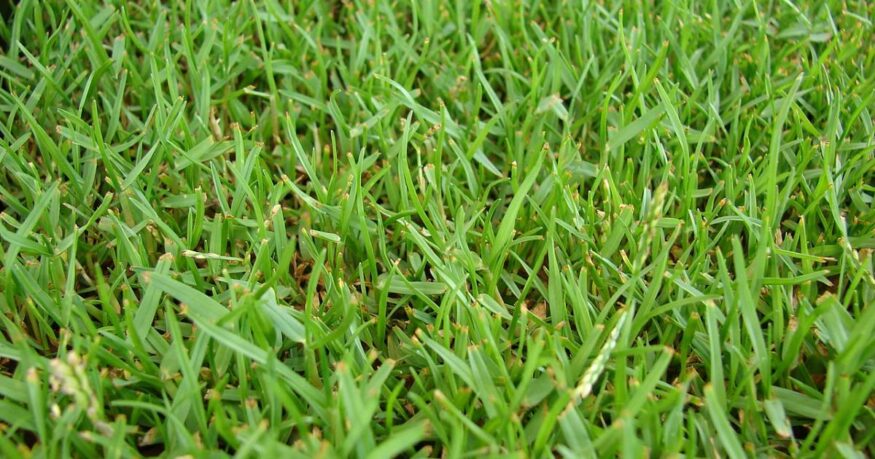
| Also Known As | Zoysiagrass; Zoysia sp. |
| Type of Grass | Warm season perennial |
| Optimal Zones | Southern through warmer transition zones |
| Root Structure | Shallow to medium |
| Winter hardiness | Good |
| Heat tolerance | Excellent |
| Shade tolerance | Partial |
| Water Requirements | Medium |
| Drought Tolerance | Good |
| Self Repair Capacity | Low |
| Overall Maintenance Requirements | Moderate |
Why Zoysia Grass Is a Popular Grass seed Choice
Choosing the right grass for your Massachusetts lawn can be a bit of a head-scratcher. With numerous factors to consider, it can seem like an overwhelming task. But fear not, Zoysia Grass may be your lawn’s new best friend!
Here’s why:
- The Massachusetts Climate Champion: Massachusetts is known for its hot summers and cold winters, and Zoysia Grass is a champ when it comes to handling these contrasting conditions. It’s a warm-season grass, thriving in hot summers while also enduring frigid winter temperatures. Thanks to its deep root system, it stays lush and green, even in dry, drought-like conditions.
- Easy-Breezy Maintenance: If lawn maintenance feels like a chore, Zoysia Grass is your knight in shining armor. It requires less water, fertilizer, and mowing compared to cool-season grasses like Kentucky Bluegrass or Fine Fescue. This translates into more time to enjoy your yard and less time spent on upkeep.
- A Weed Warrior: Zoysia Grass is a bit of a fortress, forming a dense mat through its stolons and rhizomes. This dense cover leaves no room for pesky weeds, ensuring your lawn stays clean and healthy.
- A Disease Fighter: Stressing about lawn diseases like dollar spot and leaf spot? Zoysia Grass shows these diseases the door, offering you peace of mind and a vibrant lawn.
Like all good things, Zoysia Grass has its drawbacks. It tends to go dormant and brown during the cold months, which may affect your lawn’s aesthetic appeal. It also takes its sweet time to fully cover your lawn if you’re starting from seeds – think up to three years. However, patience is a virtue, and the result is a lush, resilient lawn that’s worth the wait.
When it comes to Zoysia Grass care, timing is key.
Plant in late spring or early summer, ensuring the soil temperature is above 70°F. Initially, water the seeds lightly and often until they germinate, then switch to less frequent but deeper watering. Fertilize once or twice a year with a balanced fertilizer, ideally in late spring and early fall. Keep the grass at a height of 1 to 2 inches when mowing and avoid removing more than one-third of the leaf blade at a time. Also, a periodic dethatching will help remove excess organic matter from the soil surface, keeping your lawn in tip-top shape.
Massachusetts Climate And Growing Challenges For Lawns
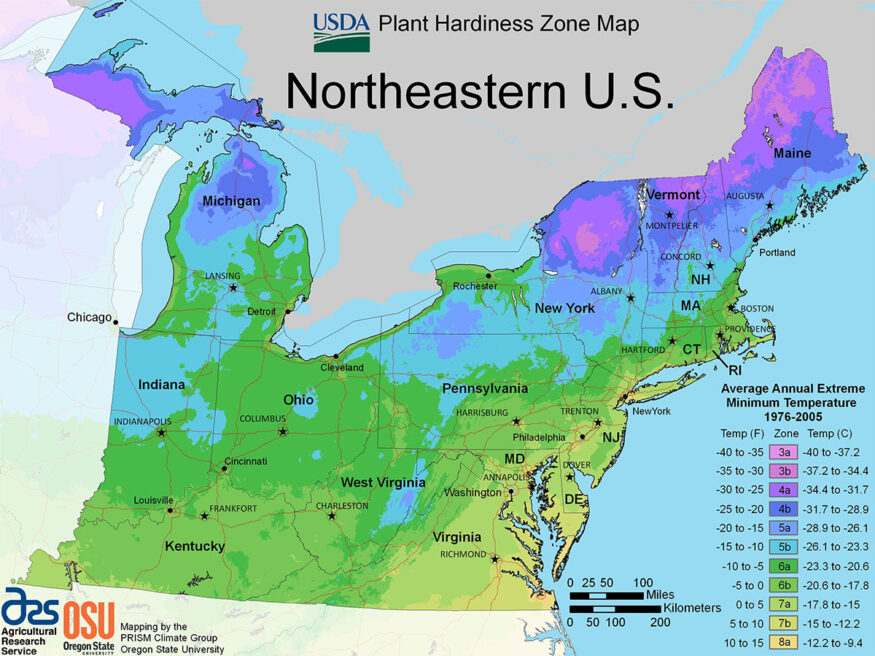
Climate
If you’re living in Massachusetts, you’re no stranger to the state’s continental climate with its four unique seasons. Summers can bring temperatures soaring into the 80s°F, while winters can see mercury dropping to 0°F or even lower. The state’s annual precipitation averages around 45 inches, with coastal areas experiencing more rainfall and inland regions receiving more snow. Depending on the location, Massachusetts falls under USDA Plant Hardiness Zones 5a to 7b.
Soil Conditions
A key component of a thriving lawn is the soil. In Massachusetts, soil primarily originates from glacial deposits, which leads to variations in texture, drainage, acidity, and fertility.
Acidic pH levels, typically between 4.0 and 6.0, can limit nutrient availability for grass growth. That’s why it’s essential to perform a soil test to determine the optimal pH and nutrient levels for your lawn. Ideally, the pH should be between 6.0 and 6.5.
To ensure a healthy lawn, it’s crucial to implement a balanced fertilizer program that provides nitrogen, phosphorus, and potassium (N,P,K).
Have a Good Lawn Care Plan
Timing is everything when planting grass seed. In Massachusetts, early fall (late August to early October) is prime time, as the soil temperature is conducive for seed germination and the air temperature is optimal for grass growth. Spring (mid-March to late April) is the second-best period, once the soil has warmed up to above 70°F and frost no longer poses a risk.
Lawn care and maintenance should be customized to your grass type, site conditions, and desired lawn quality.
Here are some general practices to follow:
- Deep, infrequent watering, preferably in the morning, to encourage deep root growth and ward off diseases.
- Regular mowing to a height of 2.5 to 3 inches, removing no more than one-third of the leaf blade at a time. Keep your mower blades sharp and clean.
- Dethatching every few years to get rid of excess organic matter that hampers water and air flow in the soil.
- Periodic core aeration to alleviate soil compaction and promote root growth. Steer clear of core aeration during crabgrass germination season (late spring to early summer).
- Weed, insect, and disease control as needed, using cultural, mechanical, biological, or chemical methods. Remember to follow label directions when using pesticides.
Despite your best efforts, Massachusetts lawns can still face challenges due to poor growing conditions, improper care, extreme weather, or specific pests and pathogens. Common issues include winter desiccation, spring frost damage, water and ice damage, snow molds, salt damage, compaction, and acid or alkaline soil. By understanding and addressing these challenges, you can maintain a healthy and beautiful lawn in Massachusetts.
Looking for the best grass seed for your region?
Our smart lawn plans are designed to work perfectly with your local soil and climate conditions, without any of the toxic stuff.
Use the code EHG20 for an instant $20 discount!
- Personalized lawn care: Custom lawn plans based on soil analysis, climate data, and your specific lawn needs.
- Convenience with a conscience: Products that are not only easy to use but also safe for you, your pets, and the planet.
- Science-backed formulas: Bio-based formulas contain effective, natural ingredients like seaweed, molasses, and iron.
- Expert support: Get one-on-one guidance from a real person and rest easy with Sunday's satisfaction guarantee.
